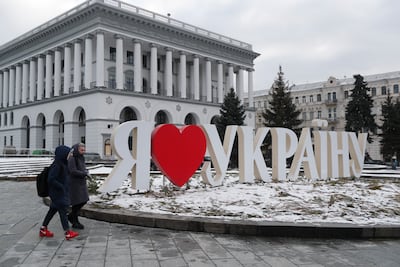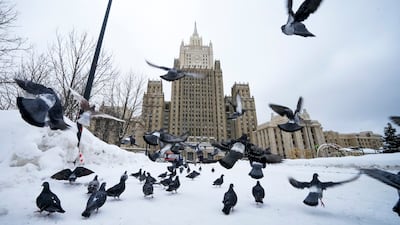Western nations are planning for contingencies in case of Russian military action in Ukraine, even as talks in Paris indicate a conflict can still be averted. For weeks, experts and officials have warned that we have not been this close to a war in eastern Europe in more than three decades – basically since the end of the Cold War.
Adding to the general anxiety, the Doomsday Clock is set at 100 seconds to midnight. It is the closest the clock has ever been to catastrophe. The clock was first set at seven minutes to midnight amid nuclear tension between the US and the Soviet Union, but moved back to 17 minutes to midnight at the end of the Cold War. We are in a bizarre echo of that tense historical era which we had hoped was long gone.
Now Russia is accused of mobilising troops for an invasion of Ukraine. Kiev’s anxiety is natural given many Ukrainians consider that 7 per cent of its territory is already occupied – in Crimea, to the south and Donbas, in eastern Ukraine.

Moscow has a list of conditions that it wants met in return for de-escalating tensions on its border with Ukraine: a guarantee that Ukraine never be allowed to join Nato, and that the security alliance pull its forces back from countries in eastern European that joined after the Cold War.
The US and Nato have rejected these conditions and have warned Moscow that any attack would trigger fresh economic sanctions. Nato says Russia seeks to create a two-tier Nato, which it finds unacceptable. At the same time Nato is calling this crisis “a defining moment for Euro-Atlantic security”. Its forces, including those of the US, are on standby and additional ships and fighter jets have been sent to eastern Europe as an added deterrence.
"We discussed our joint efforts to deter further Russian aggression, such as preparations to impose severe economic costs on Russia and reinforce security on the eastern flank,” US President Joe Biden said after a meeting on the crisis with his team last weekend.
Moscow is unimpressed. "The United States is escalating tensions," a spokesperson said. "We are watching these US actions with great concern." The propaganda war is in full swing. Although neither side could be described as winning it, Nato, at least, can say it is more relevant now than it has been at any other time in the past five years.

Everywhere, there is much concern about where the Ukraine impasse could lead, even if it doesn’t end up in a full-blown conflict. Reuters reported that a trade group – representing Chevron, General Electric and other big US corporations and separately, energy companies – are all trying to mitigate the impact of possible sanctions on Russia on their businesses. Both in Washington and in the capitals of Europe, moves are being made to deal with a reduction in Russian gas supplies in an already tight market.
There is an imbalance in the cost of escalation that will be largely borne by European nations, and not just in access to energy. The US, UK and Canada, which have been the most vocal in their warnings to Moscow, would not suffer directly but they would still not relish being bogged down in another war so soon after Nato powers have left Afghanistan.
Sanctions have the potential to hurt Russia. It would seem there is enough incentive to stave off disaster. More talks are planned in Berlin in two weeks between Ukraine and Russia. This is “a good sign”, according to officials. The US is attempting to look tough while also saying diplomacy is its preferred route out of the crisis.
Even when there is a resolution, the consequences of the stress of the past few weeks may be felt for years to come. While not suggesting the Ukrainians should be left unsupported in any way, there are signs of a split among western powers in terms of priorities. All countries are already under enormous pressure thanks to the pandemic. It is also worth recalling how the US backing for the 2003 Iraq invasion divided world powers. The Middle East has lived with the ramifications of that misalignment ever since.
Even more worryingly, the likely fall-out from Ukraine is already a distraction from potentially more destabilising crises. Both Russia and the US are needed badly elsewhere. In terms of the potential for a fresh conflict this year, International Crisis Group has, for example, highlighted the threat from ISIS and Al Qaeda-linked groups in Africa. Other hotspots are Afghanistan, Myanmar, Haiti, Ethiopia and, as seen in the first weeks of this year, Yemen.
Terrorism remains arguably the biggest threat today. Yes, Ukraine matters and how the US and Russia show support for allies during difficult times is crucial for world stability. The fight against Covid-19 is not over; adding to which, snow storms and extreme weather have put people in the region in peril. More lives are bound to be lost. A collective response will be needed especially as the next humanitarian crisis may be just around the corner. Leaders of great powers would do well to keep this in mind as they choose what to do next.


